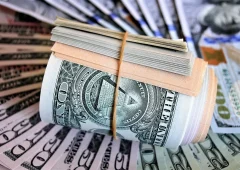Fed Will Cut Rates This Year, According to Bloomberg Analyst
15.07.2024 8:30 2 min. read Alexander Stefanov
Bloomberg analyst Mike McGlone anticipates significant developments at the Federal Reserve, foreseeing potential interest rate cuts in response to recent shifts in US equities.
This marks a pivotal moment as the central bank navigates a changing economic landscape characterized by easing inflationary pressures and softening labor market conditions.
McGlone draws comparisons to historical rate hike cycles, highlighting precedents where rate reductions followed extended periods of tightening policy, potentially mirroring the current trajectory.
Yeah, the Fed’s gonna cut rates. From 2004-06, the #FederalReserve hiked 425 bps and the surprise index floor came in December 2006. September 2007 marked the first rate cut. July 2023 was the last of 525 bps of rate hikes that started in 1Q22. Sticky #inflation may delay Fed… pic.twitter.com/sYl6xnD214
— Mike McGlone (@mikemcglone11) July 13, 2024
Federal Reserve Chair Jay Powell and other officials signal readiness to adjust monetary policy, citing improved control over inflation and a cautious approach to sustaining economic growth. Recent economic data supports the case for easing, with indicators pointing towards manageable inflation levels and moderate job market adjustments.
This backdrop sets expectations for the Fed to announce a 25 basis point rate cut in September, with potential for additional measures depending on economic indicators and global financial developments.
Market sentiment reflects growing confidence in the Fed’s ability to steer a balanced course, with traders pricing in anticipated rate cuts to stimulate economic activity and bolster market stability.
The Fed’s strategy aims for a “soft landing,” aiming to curb inflationary pressures without jeopardizing employment gains, aligning with global efforts among central banks to foster sustainable economic recovery in the post-pandemic era.
-
1
U.S. Announces Sweeping New Tariffs on 30+ Countries
12.07.2025 16:30 2 min. read -
2
US Inflation Heats Up in June, Fueling Uncertainty Around Fed Cuts
15.07.2025 16:15 2 min. read -
3
Key U.S. Economic Events to Watch Next Week
06.07.2025 19:00 2 min. read -
4
Gold Beats U.S. Stock Market Over 25 Years, Even With Dividends Included
13.07.2025 15:00 1 min. read
US Inflation Heats Up in June, Fueling Uncertainty Around Fed Cuts
U.S. inflation accelerated in June, dealing a potential setback to expectations of imminent Federal Reserve rate cuts.
Gold Beats U.S. Stock Market Over 25 Years, Even With Dividends Included
In a surprising long-term performance shift, gold has officially outpaced the U.S. stock market over the past 25 years—dividends included.
U.S. Announces Sweeping New Tariffs on 30+ Countries
The United States has rolled out a broad set of new import tariffs this week, targeting over 30 countries and economic blocs in a sharp escalation of its trade protection measures, according to list from WatcherGuru.
Key U.S. Economic Events to Watch Next Week
After a week of record-setting gains in U.S. markets, investors are shifting focus to a quieter yet crucial stretch of macroeconomic developments.
-
1
U.S. Announces Sweeping New Tariffs on 30+ Countries
12.07.2025 16:30 2 min. read -
2
US Inflation Heats Up in June, Fueling Uncertainty Around Fed Cuts
15.07.2025 16:15 2 min. read -
3
Key U.S. Economic Events to Watch Next Week
06.07.2025 19:00 2 min. read -
4
Gold Beats U.S. Stock Market Over 25 Years, Even With Dividends Included
13.07.2025 15:00 1 min. read


